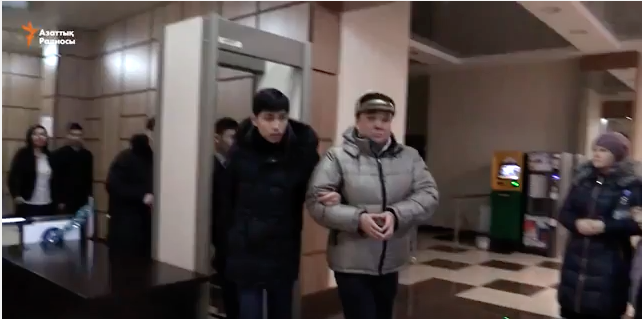Kazakhstan: An Absurd Travesty of Injustice in Yklas Kabduakasov’s case
 Friday, April 22, 2016 at 01:27PM
Friday, April 22, 2016 at 01:27PM  Verdict, p. 10
Verdict, p. 10
*This phrase translates as follows: "We cannot be traitors to Islam in any way."
Yklas was eventually sentenced to two years in a prison camp for uttering this phrase during a Sunday sermon for Evangelical Christian Baptists. I find it difficult to call this anything less than an absurd travesty of injustice.
In the fight against religious extremism and hatred, the state should always respect the freedom of religion and belief, which is an inalienable, boundless, and universal right. According to Paragraph 2, Article 4 of the International Covenant on Civil and Political Rights, the human rights that cannot be altered or suspended, even in a state of emergency, are the rights to freedom of thought, conscience, and religion, which are on par with the right to life.
Unfortunately, in modern-day Kazakhstan, we are seeing many disturbing trends in religious policy. As an illustration, I would like to present the case of Yklas Kabduakasov, the first Christian in Kazakhstan to be convicted and sentenced to a real prison term for his faith. (It should be noted that he is not the first Christian in the nation to be convicted for his faith. There have been many others, such as Pastor Bakhytzhan Kashkumbayev, who was arrested under fabricated charges in May 2013, but his prison sentence was eventually suspended.)
In August 2015, Yklas Kabduakasov, who converted from Islam to Christianity, was arrested and subsequently charged under Article 174 of the Criminal Code. In the indictment, he was accused of misinterpreting the Sacred Books, the Koran and the Bible, and spreading religious discord among indigenous Muslim people. Yklas’s arrest is particularly disturbing, because Kazakhstan’s constitution guarantees the freedom of belief.
It appears that this nation is breaking its own religion laws, which brings up several questions. On what basis could investigators and experts in Kazakhstan, a secular country, expect to correctly evaluate Yklas’ religious convictions and actions? Why did Kazakh police officers ask him provocative questions about his faith when they already knew about his Christian convictions? Why did experts without any philological, theological, or religious education conduct a philological analysis of faith and religion? In addition to these disconcerting facts, after the first day of Yklas’ trial, the media publicized a report based on false information, in which they accused him of calling for war against Islam. Many subsequent articles containing false information about the trial were also published.
Below is an excerpt from the trial’s verdict, where you can clearly see the absurdity of Yklas’ sentence.
The Court has reliably determined that the convicted defendant, before the meeting with the witnesses, was actively engaged in propagandistic activities in a community of indigenous natives aimed at disseminating the teachings of the Christian religion, and the establishment of its superiority and the inferiority of the Islamic religion.
In this regard, the Court rightly took as the basis for the sentence the above testimony of witnesses who unswervingly and consistently over the pre-trial investigation and the court hearing insisted that Kabduakasov publicly distributed religious ideology aimed at inciting religious hatred.
Their statements are consistent with the case materials produced in the trial.
Thus, from the videos viewed in the courts of first and appellate instances, it follows that in Kabduakasov's statements, we can trace elements of a negative attitude towards Islam, and the superiority of the Christian religion.
For example, in an episode dated 10/04/2014, despite the fact that Kabduakasov was in the audience while Deacon K. Dyakonov was conducting divine service among the parishioners, Kabduakasov expresses his opinion about Islam in the following phrase: "Бiз саткын Ислам бела алмаймыз никак”*, which testifies to his negative attitude towards Islam and his imposition of his beliefs on the indigenous.
Verdict, p. 10
*This phrase translates as follows: "We cannot be traitors to Islam in any way."
Yklas was eventually sentenced to two years in a prison camp for uttering this phrase during a Sunday sermon for Evangelical Christian Baptists. I find it difficult to call this anything less than an absurd travesty of injustice.
The case against Yklas Kabduakasov shows that Christians in Kazakhstan are in no better position than during the Soviet era, when Christians were imprisoned for their faith, as this is still happening today.


Reader Comments